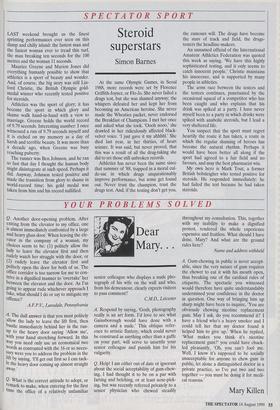SPECTATOR SPORT
Steroid superstars
Simon Barnes
LAST weekend brought us the finest sprinting performances ever seen on this damp and chilly island: the fastest man and the fastest woman ever to tread this turf, the man breaking ten seconds for the 100 metres and the woman 11 seconds.
Maurice Greene and Marion Jones did everything humanly possible to show that athletics is a sport of beauty and wonder. And, of course, the big story was still Lin- ford Christie, the British Olympic gold- medal winner who recently tested positive for steroids.
Athletics was the sport of glory; it has become the sport in which glory and shame walk hand-in-hand with a view to marriage. Greene holds the world record of 9.79 seconds. Interesting number: I once witnessed a run of 9.79 seconds myself and it is etched on my memory as a day of harsh and terrible beauty. It was more than a decade ago, when Greene was busy reaching puberty.
The runner was Ben Johnson, and he ran so fast that day I thought the human body might disintegrate at such speed. Perhaps it did. Anyway, Johnson tested positive and made the transition from glory to shame in world-record time; his gold medal was taken from him and his record nullified. At the same Olympic Games, in Seoul 1988, more records were set by Florence Griffith-Joyner, or Flo-Jo. She never failed a drugs test, but she was shamed anyway; the whispers defeated her and kept her from becoming an American heroine. She never made the Wheaties packet, never endorsed the Breakfast of Champions. I met her once and asked what she took. 'Oooh n000,' she drawled in her ridiculously affected black- velvet voice. 'I just gave it my ahhhhl.' She died last year, in her thirties, of heart seizure. It was said, but never proved, that this was a result of all the drug-taking she did to set those still unbroken records.
Athletics has never been the same since that summer of '88, trapped in a moral cul- de-sac in which drugs unquestionably improve performance, but some get found out. Never trust the champion, trust the drugs test. And, if the testing don't get you, the rumours will. The drugs have become the stars of track and field, the drugs- testers the headline-makers.
An unnamed official of the International Amateur Athletics Federation was quoted this week as saying, 'We have this highly sophisticated testing, and it only seems to catch innocent people.' Christie maintains his innocence, and is supported by many people in athletics.
The arms race between the testers and the testees continues, punctuated by the occasional squeal of a competitor who has been caught and who explains that his drink was spiked at a party. I have never myself been to a party in which drinks were spiked with anabolic steroids, but I lead a very sheltered life.
You suspect that the sport must regret heartily the route it has taken, a route in which the regular shaming of heroes has become the natural rhythm. Perhaps it would have been better all along if the sport had agreed to a fair field and no favours, and may the best pharmacist win.
My own hero is Mark Tout, a former British bobsleigher who tested positive for steroids. He responded immediately: he had failed the test because he had taken steroids.


























































 Previous page
Previous page